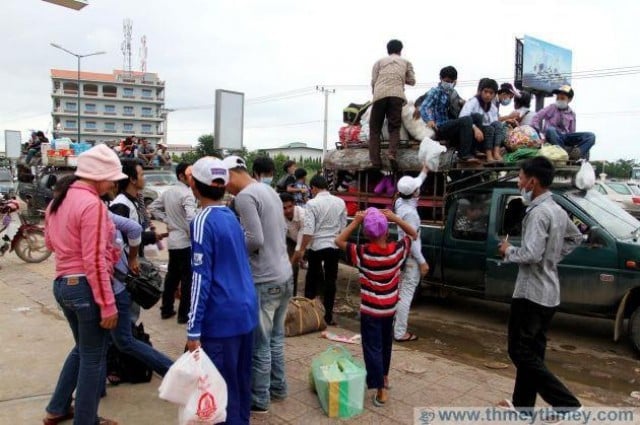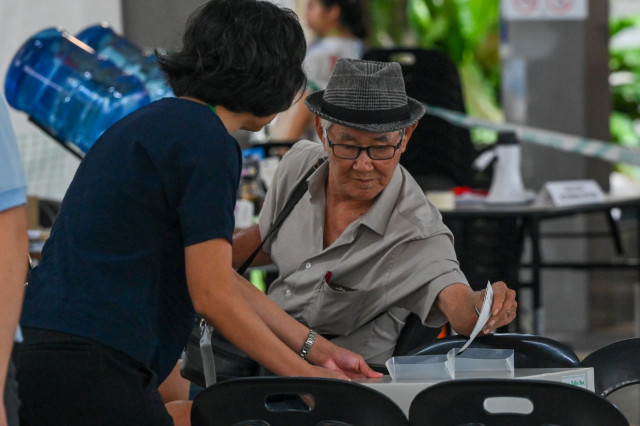Labor Ministry Reports $3 Billion in Remittances, but Migrant Rights Remain Insecure

- By Teng Yalirozy
- March 1, 2022 9:54 PM
The estimated $3 billion sent back to Cambodia by migrant workers has, according to rights advocates, often come at the cost of insecure employment and rife exploitation of Cambodians abroad
PHNOM PENH--A report released on Feb. 25 by the Ministry of Labor found that Cambodian migrant workers sent more than $3 billion in remittance back to their families in 2021, a sharp increase from the $1.2 billion reported in 2020 and the $1.5 billion reported in 2019 by the National Bank of Cambodia.
According to the Ministry of Labor, at least 1.3 million Cambodians were living and working abroad as of 2021, with each apparently sending back more than $2,300 over the course of the year on average to see remittances soar to $3 billion—roughly 11 percent of Cambodia’s GDP in 2020.
However, data from the National Bank of Cambodia’s balance of payment reports for Q3 2021 shows that during the first three quarters of 2021, the National Bank of Cambodia recorded slightly more than $805.5 million in remittances.
Heng Sour, a spokesperson of the Labor Ministry, said that the $3 billion is based on the ministry’s estimations.
“Even though the COVID-19 pandemic has struck the world, our workers in [South] Korea, Japan and elsewhere have been allowed to continue their stay in host countries, even when visas or employment contracts ended,” said Sour. “So, the working time actually increased in the sectors our workers are employed in [abroad].”
Sour went on to note that the National Bank of Cambodia only records official transfers and added that most Cambodian migrant workers still rely on informal channels to send money back home to their families, which is rarely tracked in official data.
But while the Ministry of Labor applauded these figures, pointing to the economic contributions made by Cambodians living abroad, labor rights groups and migrant workers have warned of the need for greater protections while working abroad.
Bo Sopheak, who returned from Thailand to Cambodia in December 2021, said that for two years working in Thailand, he had not received enough wages—some months he was not paid at all—as he said he was an undocumented worker who illegally entered Thailand through a broker.
He continued that it was difficult to seek help from the Cambodian Embassy as he was an illegal migrant worker.
“I could not send back much money to my families as I was paid only $500 a month and I faced problems in Thailand,” Sopheak said. “Some months, I was not paid at all. When I knew that I was being exploited, I asked for help but no-one could.”
Sopheak did not reject the ministry’s report, saying some people got paid $3,000 a month as they were in the right workplace, but in his case, he was deceived and exploited.
Originally from Prey Veng Province, Sopheak has returned to Cambodia with no job secured and remains unemployed, but despite this, he said he would not go back to working abroad.
Throughout the COVID-19 pandemic, Cambodian migrant workers—particularly those in Thailand and those who had chosen informal paths of migration—suffered from a lack of support, receiving only limited supplies to stay safe from the Cambodian Embassy and often no help from employers or the Thai government.
Khun Tharo, a veteran advocate at local labor rights group CENTRAL, said the increased remittances was a good sign, but he remained concerned about the human and labor rights violations, as well as exploitation, that continued to go unaddressed.
He emphasized that the specific policy and resolution mechanism to support and protect Cambodian migrant workers in all countries were crucial.
“What’s important is the lack of a legal framework of the Memorandum of Understanding [MOU] for sending migrant workers to other countries,” he said. “It is important to include an MOU in sending workers between the receiving country and the sending country so that the affected workers can file an effective complaint.”
Cambodians migrating for work often take on huge risks, as well as expenses, but a recent initiative from UN Women and the International Labour Organisation has introduced an app that aims to provide insights and support for Cambodians prior to leaving their country. But even with more access to information, the costs and risks associated with migrating remain prohibitive and activists say that safeguards are not in place to prevent Cambodians from being scammed or exploited.
Moreover, Tharo said, all Cambodian workers who go abroad to work have to pay a lot of money for service, training, passports, or accommodation before leaving to work overseas. This forces them to take out loans from microfinance institutions and repay them when they go out to work.
“I think it’s better to eliminate those expenses,” he said. “The government should think of a system where they can send workers by themselves like sending workers to South Korea. It will reduce the expenses of workers. And it is also better to prevent the private agencies from illegally sending workers as it can cause problems and the workers can face rights violations.”
Tharo encouraged the transfer of the National Social Security Fund system from those countries to the Cambodian system, citing the example of South Korea and Cambodia, in which the National Social Security Fund is transferred from a similar system in Korea to the Cambodian system under the auspices of the Ministry of Labor.
“The management system should be integrated so that they can enjoy the same benefits as other workers,” he said.
The Government of Cambodia has decided to continue to promote the implementation of the Labor Migration Policy for Cambodia 2019-2023 and related legal standards to protect and promote the rights and interests of workers, including the protection of society while working and having returned home, the report said.
So far, more than 1.3 million Cambodian workers are working abroad, of which 1.2 million are working in Thailand, more than 45,000 are in South Korea, 23,000 in Malaysia, South Korea, 11,000 in Japan, more than 800 in Singapore, 200 in Hong Kong and 43 in Saudi Arabia, according to the Ministry of Labor’s report.















